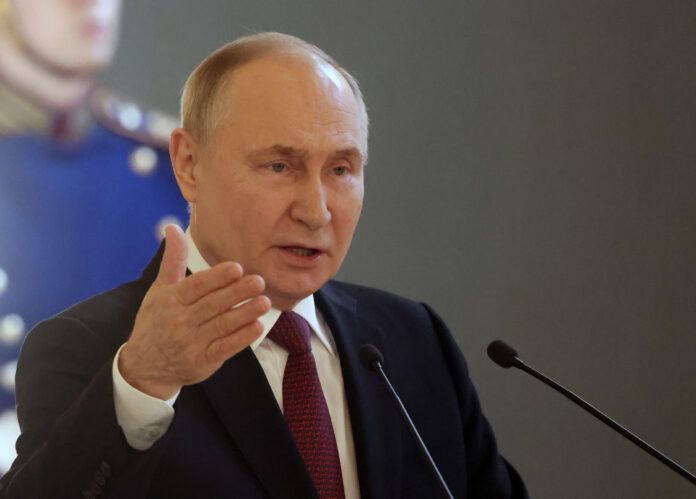Recent signs suggest that Russian President Vladimir Putin is potentially preparing for war with NATO sooner than expected, according to a U.S.-based think tank.
In a Wednesday assessment, the Institute for the Study of War (ISW) wrote that “several Russian financial, economic, and military indicators suggest that Russia is preparing for a large-scale conventional conflict with NATO, not imminently but likely on a shorter timeline than what some Western analysts have initially posited.”
The ISW has previously warned of signs that Russia could be getting ready for a war with the alliance. Last month, the think tank said a new military decree from Putin that reestablished the Moscow and Leningrad Military Districts indicate he is preparing for a potential conflict with NATO.
Newsweek reached out to the Kremlin via email on Thursday for comment.
Photo by Contributor/Getty Images
Tensions between Russia and NATO have been high since Putin launched a full-scale invasion of Ukraine in February 2022. The alliance has steadfastly sided with Kyiv, and member countries have funneled financial aid and weapons to Ukrainian President Volodymyr Zelensky’s armed forces.
Russian officials and propagandists have also warned of a potential war between Russia and NATO, and guests on Kremlin-operated media outlets have routinely called for strikes on U.S. soil and the West.
Putin also spoke of the prospect of a war between Moscow and NATO that could lead to World War III when he claimed victory in last weekend’s presidential election in Russia.
When asked during a press conference on Sunday about the possibility of a conflict between Russia and the West, Putin said he thinks “everything is possible in the modern world.”
He continued: “But I have already said, and it is clear to everyone, that it will be one step away from a full-scale third world war. I think hardly anyone is interested in this.”
The ISW wrote that Putin recently met with the leaders of Russian State Duma factions to discuss priorities for his fifth presidential term. He reportedly spoke of “the importance of developing the Russian economy and expanding the social programs” he announced last month.
Putin has also called on State Duma faction leaders to act in the interest of the state rather than be influenced by corporations or parties.
According to the ISW, such moves indicated Putin is “likely attempting to set conditions to stabilize Russia’s long-term financial position at a higher level of government expenditure and is signaling that Russia’s long-term financial stability will require imposing at least some pain on some wealthy industrialist siloviki (Russian strongmen with political influence).”
By risking damage to his relationship with wealthy Russian clients, “Putin’s attempts to set conditions to stabilize Russia’s economy and finances are most likely part of Russian financial and domestic preparations for a potential future large-scale conflict with NATO and not just for a protracted war in Ukraine,” the think tank said.
The Russian military is also making structural moves to continue supporting its war in Ukraine while building Russia’s capabilities in the event of a full-scale war with NATO, said the ISW. This includes notable personnel changes within the Russian Ministry of Defense.
The ISW noted that officials from NATO countries have warned about a possible looming attack from Russia. On Wednesday, Polish President Andrzej Duda said during an interview with CNBC that Putin appears to be ramping up efforts to shift Russia’s economy to war footing. Citing unspecified German research, Duda said Putin intends to attack NATO as early as 2026 or 2027.
Last month, Danish Defense Minister Troels Lund Poulsen said recently acquired intelligence pointed toward a Russian attack on a NATO country within three to five years, which he said was earlier than a timeline from a 2023 NATO assessment.
Uncommon Knowledge
Newsweek is committed to challenging conventional wisdom and finding connections in the search for common ground.
Newsweek is committed to challenging conventional wisdom and finding connections in the search for common ground.


